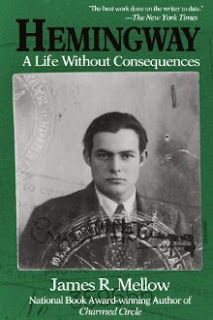Book Review - Hemingway - A Life Without Consequences
Book Review: Hemingway-A Life Without Consequences
James R. Mellow ISBN 0-201-62620-9 Houghton Mifflin 1992
Until I read this three-dimensional biography of the American writer who taught the modernists how to write, I thought I knew all I wanted to know about Ernest Hemingway. It's all in his literature; it's all in the press and the archives, I thought. But I did not find the man I thought I knew in this biography by James Mellow. Eureka! Biographer James Mellow is as much an artist of life history as the artists he writes about.
For Hemingway buffs, "A Life Without Consequences" is the most enlightening portrait arguably of the most influential writer of the twentieth century. Much of what we already know about the man is documented ad nauseam. That he was and is universally disliked by some, adored and imitated by others can be found in letters to and from him, his four wives, publishers, editors and friends; not to mention his countless critics, "the maligning bastards" he likens to the hyenas of his Africa novels.
To understand this complex man who took his own life, the expatriate behind the legendary heroic war correspondent, newspaper man, big-game hunter, hard drinking, womanizing, openly bigoted, deeply romantic, envious of peers, foul-mouthed winner of the Pulitzer Prize for Print Journalism, and the Nobel Prize for Literature, you have to read this book. The extraordinary legacy he left of where he came from, what life did to him and why he did what he did with his life, pulsates in the real characters, places and events of this epic that reads better than a novel.
Born into an upper middle class late 19th century Victorian family in Chicago's fashionable Oak Park suburb, the Hemingway that Mellow reveals may or may not have been greatly influenced by his musically talented mother Grace and his physician father Clarence. But most of his work appears autobiographical; his family, boyhood and adult friends and enemies are the basis for the characters in his stories. Sadly, his father, brother and granddaughter Margo all committed suicide.
The woodsy hunting and fishing scenes of his childhood, his first encounters with girls and sex, reveal wonderful glimpses into a simpler time. His tragic wartime experiences appear in the Nick Adams stories and in later novels. Everything he did as Ernest Hemingway is in his fiction. And of course so are Paris, Spain, Cuba, Key West and life and death. Old photos show Hemingway the boy dressed as a girl, which was common then. In maturity, Hemingway overcompensates for manliness by demonizing homosexuality. He exaggerates his masculinity by womanizing (my take) and in engaging in love affairs while "happily" married. Mellow includes photos of Hemingway's family and the people he knew before, during and after two world wars, including his celebrated wives.
Hemingway belongs to the less is more class of literary noir that found its way to Hollywood's money machine. Joining writers like Dashiell Hammett (The Maltese Falcon) and Raymond Chandler (The Big Sleep), Hemingway's "The Killers" and "To Have And Have Not" are the classic hard-boiled noir genre of a man who allowed no interruptions, no intrusions into his writing life. He worked from dawn to noon, and drank the rest of the day. His characteristic brevity, with plenty of space between hard-hitting dialog, finds its way into his novels. By asking the reader to question, to contemplate what the characters might be thinking but not saying, Hemingway is engaging the imagination. With some exceptions, I think this is why most motion picture screenplays are not as successful as his original books.
The famous post-Stalinist Russian poet Yevgeny Yevtushenko (now in his eighties) admired Hemingway. As a young man Yevtushenko wrote a poem about his chance encounter with "the old man" in a Copenhagen airport café/bar.
"The old man (Hemingway) moves with grim victorious determination ... the earth seemed to bend beneath him, so heavily did he tread upon it. Rejecting a Vermouth and Pernod with a resounding 'No' he is served Russian Vodka, clearly more to his liking."
Everything about Ernest Hemingway is bigger than life until he can no longer tolerate the myth he has cultivated and the expectations he has of himself. His body physically ailing from war wounds and plane accidents, his mental abilities fading, what else is left for Papa than to blow his brains out?
My website is under reconstruction until 2010. Meanwhile, you can find me at http://newagejournal.com/2007/spirituality/the-eternal-search-for-who-am-i
You can also read two chapters of my novel, The Sword and the Chrysanthemum, Journey of the Heart at http://www.samurai-archives.com/guestart.html
Article Source: http://EzineArticles.com/?expert=Susan_Scharfman
http://EzineArticles.com/?Book-Review---Hemingway---A-Life-Without-Consequences&id=460742

No comments:
Post a Comment